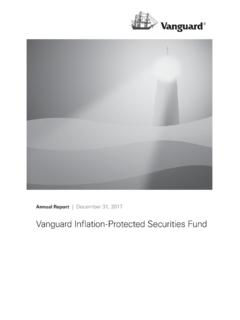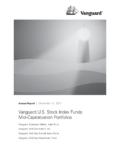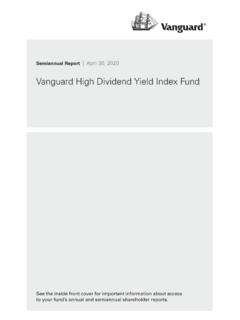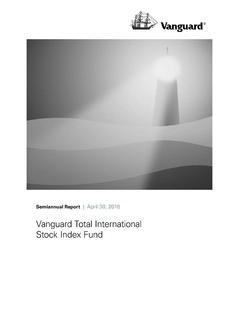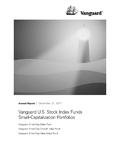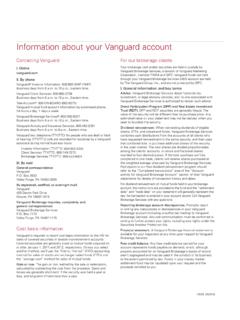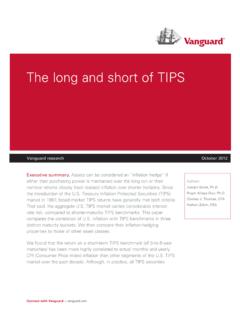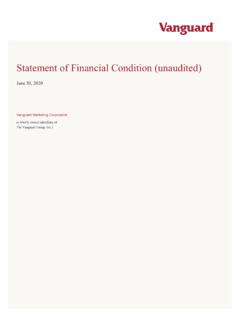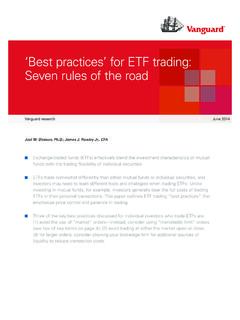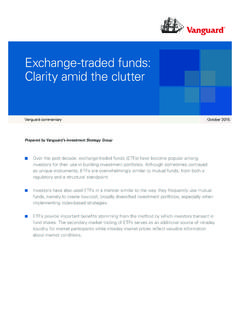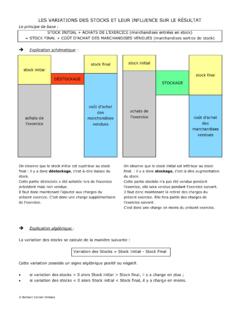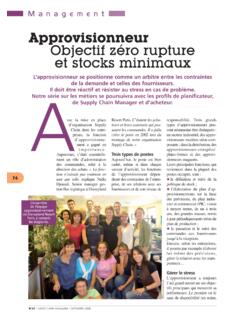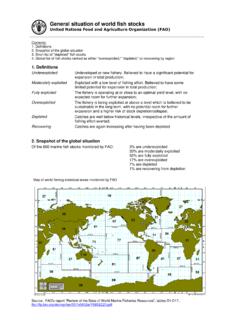Transcription of Global equity investing: The benefits of diversification ...
1 vanguard Research February 2019 Global equity investing: The benefits of diversification and sizing your allocation Regardless of where they live, investors have a significant opportunity to diversify their equity portfolios by investing outside their home market. Despite this opportunity, investors on average have maintained allocations to their home country that have been significantly larger than the country s market-capitalization weight in a globally diversified equity index. In each market we examined, our analysis indicated that volatility was reduced most with an allocation to international equities of between 40% and 50%. While this observation may help investors determine the appropriate mix of domestic and international equities, volatility reduction is not the only factor to consider.
2 This paper concludes that although no one answer fits all investors, Global market-capitalization weight serves as a helpful starting point in determining the appropriate allocation between domestic and international equities. In practice, many investors will consider an allocation to international equities well below Global market-capitalization weight based on their sensitivity to a number of considerations, including volatility reduction, implementation costs, taxes, regulation, and their own preferences. Brian J. Scott, CFA; Kimberly A. Stockton; Scott J. Donaldson, CFA, CFP Acknowledgments: This paper is a revision of a vanguard research paper first published in 2008 as International equity : Considerations and Recommendations by Christopher B.
3 Philips and revised again in 2014 as Global Equities: Balancing Home Bias and diversification by Christopher B. on riskAll investing is subject to risk, including possible loss of principal. There is no guarantee that any particular asset allocation or mix of funds will meet your investment objectives or provide you with a given level of income. diversification does not ensure a profit or protect against a loss. Investments in bonds are subject to interest rate, credit, and inflation risk. Investments in stocks or bonds issued by companies are subject to risks including country/regional risk and currency risk. These risks are especially high in emerging markets. Past performance is not a guarantee of future results. The performance of an index is not an exact representation of any particular investment, as you cannot invest directly in an index.
4 As of September 30, 2018, equities accounted for of the Global equity market and equities accounted for the remainder. Other developed equity markets that we will discuss in this paper and their percentage of Global market capitalization include the United Kingdom ( ), Canada ( ), and Australia ( ). While the United States is the largest developed market, its size relative to the entire Global equity market has fluctuated over time and was as low as 29% in the 1980s (Figure 1). A portfolio invested solely within an investor s home market, regardless of domicile, excludes a large portion of the Global opportunity set. The case for investing outside one s domestic marketInvesting outside one s home market has diversified the returns of what had been a purely domestic market portfolio, on average and across time.
5 The rationale for diversification is clear domestic equities tend to be more exposed to the narrower economic and market forces of their home market while stocks outside an investor s home market tend to offer exposure to a wider array of economic and market forces. These differing economies and markets produce returns that can vary from those of an investor s home market. Figure 1. Historical mix of Global equity market capitalizationNotes: The market is represented by the MSCI USA Index; the market is represented by the MSCI World Index ex USA from 1969 through 1987 and the MSCI All Country World Index ex USA thereafter. Data are as of September 30, : Thomson Reuters Datastream, FactSet, and of Global equity market204080100% marketInternational market3At a high level, the benefit of Global diversification can be shown by comparing the volatility of a Global index with that of indexes focused on individual countries.
6 In Figure 2, the benefit of diversification is clear. While the United States had the lowest volatility of any individual country examined, its volatility was slightly higher than that of the Global market index. Other countries examined had volatilities that were 15% to 100% greater than the Global market index. Can multinational corporations provide enough exposure? One common question about exposure to stocks outside one s home market is whether domestic multinational companies have enough coverage of foreign markets embedded in their prices. The thinking goes that, because many large domestic firms generate a significant portion of their revenue from foreign operations, the diversification benefits of Global investing are already reflected in their prices and performance.
7 While this aspect of globalization cannot be ignored (and certainly can have an impact on investors portfolios), we believe it still makes sense for investors to hold international equities, for several reasons. First, simply focusing on domestic companies means an investor has no stake in leading Global companies that are domiciled outside their home market. Second, many firms seek to hedge away currency fluctuations of their foreign operations. Although this can help smooth revenue streams, foreign exchange can be a diversifier for an investor s portfolio. Finally, a portfolio made up solely of domestic firms is likely to have less-diversified sector exposures than the Global equity market portfolio. Figure 2. Volatility of returns for country and the Global marketNotes: Country returns are represented by MSCI country indexes; the Global market return, including both developed and emerging markets, is represented by the MSCI All Country World Index.
8 All data are from January 1, 1970, through September 30, : vanguard , Thomson Reuters Datastream, and volatilityUnited StatesAustraliaAustriaBelgiumCanadaDenma rkFranceGermanyHong KongItalyJapanNetherlandsNorwaySpainSwed enSwitzerlandUnited KingdomEmerging marketsDeveloped markets market010203040%4 Given Global exposure, how much? The decision to invest globally is only the first step. The next step is to determine an appropriate allocation. The standard financial-theory approach, whether for a Global allocation or for an allocation within a specific country or market, is to invest proportionally according to market capitalization. This method assumes that markets are reasonably efficient and that stock prices reflect all the available information, investment positions, and expectations of the investing community.
9 Investors who follow a market-cap-weighted approach would invest of their equity portfolio in equities while investors in countries such as Japan, the , Canada, and Australia would allocate less than 10% of their equity portfolio to their domestic stock market. Scott et al. (2017) found that, in practice, most investors in these markets exhibit a strong home bias and overweight domestic equities relative to their Global market-capitalization factor to consider in determining how much to allocate outside domestic equity markets is diversification . One way to evaluate the expected diversification benefits of international equities is to analyze the impact on portfolio volatility as incremental allocations of international equities are added to a domestic equity portfolio.
10 Figure 3 shows the results from the vanguard Capital Markets Model (VCMM) of a ten-year forward-looking minimum-variance analysis between domestic stocks and international stocks across four developed markets the United States, Canada, the United Kingdom, and combination of imperfectly correlated returns across countries and lower Global market volatility means that investors in each market examined will likely realize diversification benefits from incremental allocations to international stocks. In each market, the marginal benefit to international diversification declines as allocations to international equities increase and the downward-curving lines in Figure 3 illustrate that volatility actually begins to rise with allocations of greater than 40% to 50% to international equities.
